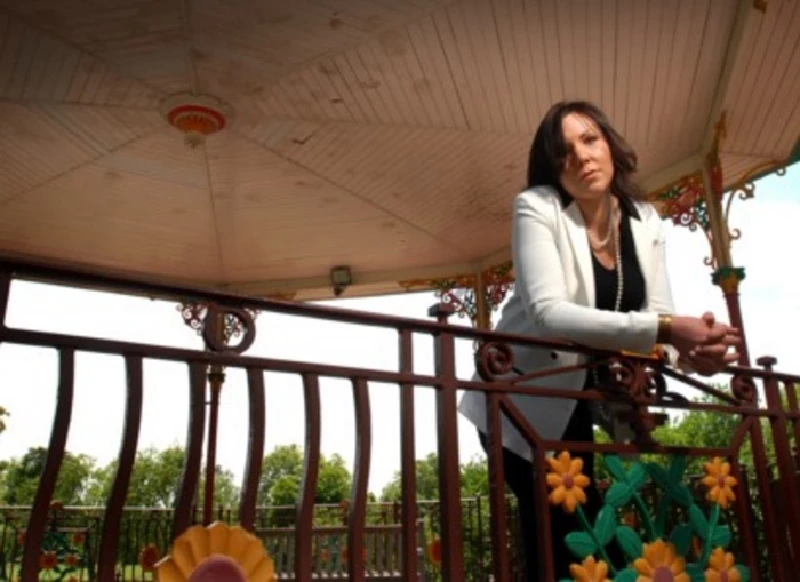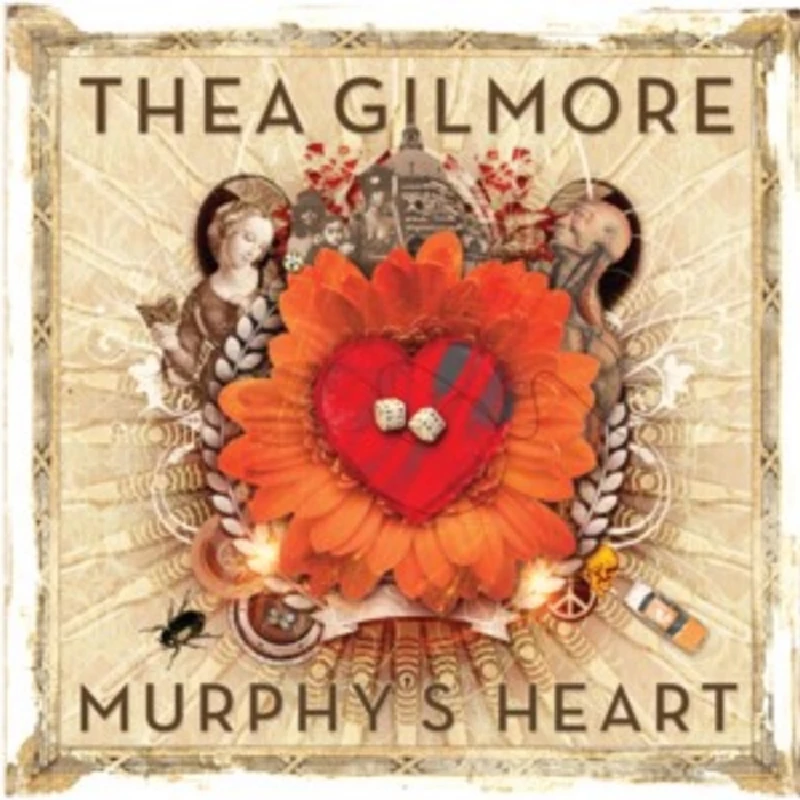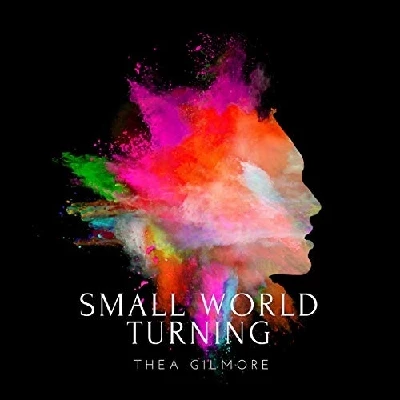Thea Gilmore - Interview
by Lisa Torem
published: 6 / 9 / 2010

intro
Critically acclaimed English singer-songwriter and musician Thea Gilmore talks to Lisa Torem about the challenging nature of her music and her recently released and milestone tenth album
“You don’t have to be trying to write ‘Masters of War’ every time,” says Oxfordshire-born singer songwriter Thea Gilmore. Her tenth recording 'Murphy’s Heart' feels like a debut; it is honest and diverse. Her single, ‘You’re the Radio’ is unforgivably joyous. But, the other tracks explore the “both sides now” of love, sensuality and the many sides of motherhood. In ‘Due South’ we find her “looking for hope in stiletto heels.” Gilmore has a high intellectual and emotional intelligence. She’s not afraid to let her interior monologue swing the front door wide open. And, after ten years in the music business, that’s a major accomplishment. She left home at 16, founded Shameless Records and released her debut 'Burning Dorothy' in 1998. 'The Lipstick Conspiracies', her second album, followed in 2000 and the EP 'As If the year after. The prolific artist has gone on to produce album after album in subsequent years. A journey through her past videos reveals a performer with graphic ingenuity. Encased in glass, a siren dressed in stark white, she sings, ‘Juliet (Keep That in Mind)'. This became her first Top 40 UK hit. ‘Holding Your Hand' from your 2001 third album, 'Rules for Jokers', was gracefully written; she examined on it loyalty and unconditional admiration. ‘Ever Fallen in Love’ finds her stunned by the realization that she haphazardly fell for “Mr. Wrong.” ‘Razor Valentine’ sounds as though she is singing through a megaphone. She exclaims, “I love you like a whisper/I love you all alone.” You know that anyone who dares to name an album, 'Songs for the Gutter', as she did her fourth album from 2002, is refreshingly unpretentious. But, like the song’s title, from 'Harpo’s Ghost' of 2006, ‘Slow Journey ll,’ suggests, Gilmore has chosen the road less traveled to retain her artistic integrity. And, after ten albums, she’s grown more comfortable with her self; artistically and personally Another YouTube video of Gilmore was created in coordination with Memphis-based Sun Studios. Sitting on a stool next to a brown-haired guitarist, she softly explains that when she was eight months pregnant she was filled with “joy and fear.” At that time, she wrote ‘Old Soul,’ “I felt like I knew him somehow before,” she adds. “I need the young heart of an old soul,” are sung with clarity and the subtle and simple tinsel of that threadbare guitar. “It’s got to be flesh and bones/The sweetest idea I know,” she sings more earnestly than before. That son is now 3 ½ and still inspires poetic thought. Gilmore still pours herself into stories that support those that have touched her most greatly. Even, in her 2003 album of covers, 'Loft Music', which paid tribute to songs by the Buzzcocks, Jimmy Cliff and the Ramones, she dips into blatantly emotional terrain using her frank vocal style to prove a point. Clearly Gilmore doesn’t have to write ‘Masters of War’ to win us over. But, the phrase, “I’m the drifter/you’re the place to go/I’m the song/You’re the radio” reminds us that we’re all intensely interconnected. PB: The single, ‘You’re the Radio’ preceded 'Murphy’s Heart'. The single is bright and optimistic, but the content on the album spans an array of emotions. Why was this cut chosen as a single? TG: Well.. I guess for all the reasons you mentioned. I think when people are listening casually on the radio, they don't want to hear a doom-laden minor key ballad. Mostly they want something happy to send them to work smiling. 'Radio' seemed to fit the bill. PB: Your career has spanned a decade and you didn’t receive air play until 'Rules for Jokers'in 2001. It’s known that you’ve continually declined major label contracts. Is that because you were concerned that your artistic integrity would be minimized or are there other factors? TG: The artistry was the most important factor. I never understood the idea of the business end of a creative industry fiddling with the creative end. It just seemed like a shortcut to the middle of the road. Plus I'm not very good at working for someone. To sign to a major would very definitely feel like having a boss! PB: Last year’s album, ‘Strange Communion’ was quite a mix. It included, what became, a popular Christmas song, an ode to a pagan sun god and, yikes, a Yoko Ono cover. How in the world did you come up with such diverse tracks? Oh, and have you heard back from Ono? TG: It spanned all of my feelings about the festive season. From my suspicion to my unwavering love for it so it probably stands to reason that the songs would travel those peaks and troughs... and no, I've not heard from Yoko yet! PB: You have said, about ‘Murphy’s Heart,’ “if it’s a milestone at all it’s because I feel my guard has dropped a bit.” You’ve also just turned thirty. Did this birthday translate into some kind of catharsis? TG: No. I don't really believe in 0's as a milestone. More likely it was just that natural transition into being more comfortable in my own skin and not frightened to express myself more openly. PB: You’ve travelled with your young son on tour and have referenced him on ‘Mexico’ and ‘Wondrous Thing.’ Your song, ‘Teach me to be Bad’ has sexual overtones. Do you feel that these themes are mutually exclusive? Is it time for mums to come out of the closet and say, “Hey, look at me, I’m the good mum, but I’m still a woman, too?” TG: I think its way overdue. How sex and motherhood has been mutually exclusive for so long is beyond me.. I mean.. biology folks! But yes, I think part of good parenting is being able to express yourself and be a woman. How can you be a good mother if you're constantly trying to deny part of yourself to fit some outdated, misogynistic idea of female maternal perfection? PB: ‘Automatic Blue’ tells a really fascinating story. A friend meets the love of his life after having got married and having children with someone else. You’ve stated that your friend “completely backed off, and watching someone so in love with the person they couldn’t have made me very, very sad.” You went on to say, “My father did the same thing for years and years and years so I know what the fallout feels like.”Could you clarify what you meant about this “fallout” and, also, what makes one person have a higher threshold for feeling “trapped” than another? At what point, after romantic love ceases to exist, is it plausible to discontinue a relationship, and do you feel your song addresses that paradigm? TG: I guess the fallout I'm referring to is all the shit that goes down after an affair is discovered. I had first had experience of it, of the hurt and the anger and the death throes of a marriage and the really interesting thing about the story that 'Automatic Blue' tells is that I was finally, after all these years, able to see the situation from both sides. As far as figuring at what point its plausible to continue a relationship.. I have no answer to that. The song is telling a story from one angle. It was never meant to answer questions. All good songs should ask more questions than they answer anyway. The idea of love being either an exciting rollercoaster or a daily grind is a very male, black and white opinion I think. PB: Without major airplay, you have managed to garner some famous fans; Bruce Springsteen, Joan Baez and Martha Wainwright, are a few examples. How did it come about that they were exposed to your music? TG: I've been doing this a long time. Most of the people I know have come to me through very organic means, either through knowing people they work with or meeting them at festivals and shows. PB: Who are your musical influences? Have you had vocal/instrumental training or are you self-taught? TG: I'm always in awe of the great wordsmiths, Tom Waits, Leonard Cohen. Musically speaking, I can't think of anyone more exciting than Cole Porter... and I'm totally self taught. PB: You’re embarking on a tour in the UK to support the new album. Is it challenging to bring those feelings produced in the studio to a live audience? Does this affect your choice of material when performing live? TG: It's more challenging in a musical sense I think. I'm totally comfortable sharing these songs, but finding a way to interpret them musically live, to bring something new to them without losing the studio sound always takes a lot of thought. PB: What advice would you give to singer-songwriters as far as keeping one’s vision authentic, and working successfully with studio engineers and producers, now that you’ve reached number ten? TG: Don't take advice. If it feels right artistically, then it is. PB: If you had three wishes, what would they be? TG: Sheesh. Well, the good person in me would request peace, an end to famine and ending racial, sexual and gender hatred. If I could have 3 more they'd be to fly, to hear people's thoughts and a limitless supply of fizzy cola bottles. PB: What’s next? TG: The world...Ha ha ha.... PB: Thank you.
Band Links:-
http://www.theagilmore.net/https://www.facebook.com/theagilmoreofficial
https://twitter.com/theagilmore
https://www.instagram.com/theagilmore/
https://www.youtube.com/user/TheaGilmore
Picture Gallery:-


interviews |
|
Interview (2008) |

|
| Massively acclaimed British singer-songwriter Thea Gilmore has just released her seventh album, the stark and acoustic 'Liejacker', which is both a call for truth and a testament to two turbulent years in her life. She talks to John Clarkson about it |
reviews |
|
Small World Turning (2019) |

|
| New album from Thea Gilmore featuring Cara Dillon, Seth Lakeman and a host of others which shows Gilmore is still in a class of her own |
| Don't Stop Singing (2011) |
| John Wesley Harding (2011) |
| Murphy's Heart (2010) |
most viewed articles
current edition
Carl Ewens - David Bowie 1964 to 1982 On Track: Every Album, Every SongArmory Show - Interview with Richard Jobson
Colin Blunstone - Thalia Hall, Chicago, 16/7/2025
John McKay - Interview
Visor Fest - Valencia, Spain, 26/9/2025...27/9/2025
Bathers - Photoscapes 1
Billie Eilish - O2 Arena, London, 10/7/2025
Loft - Interview
Robert Forster - Interview
Sir Tim Rice - Interview
previous editions
Heavenly - P.U.N.K. Girl EPManic Street Preachers - (Gig of a Lifetime) Millennium Stadium, Cardiff, December 1999
Beautiful South - Ten Songs That Made Me Love...
Oasis - Oasis, Earl's Court, London, 1995
Coldplay - Wembley Arena. London, 16/8/2022
Peter Perrett - In Dreams Begin Responsibilities Interview Part One
Prolapse - Interview
Boomtown Rats - Ten Songs That Made Me Love....
Trudie Myerscough-Harris - Interview
Pixies - Ten Songs That Made Me Love...
most viewed reviews
current edition
Sick Man of Europe - The Sick Man of EuropeDavey Woodward - Mumbo in the Jumbo
Amy Macdonald - Is This What You've Been Waiting For?
Lucy Spraggan - Other Sides of the Moon
Phew, Erika Kobayashi,, Dieter Moebius - Radium Girls
Bush - I Beat Loneliness
Suzanne Vega - Flying With Angels
Blueboy - 2
Alice Cooper - The Revenge of Alice Cooper
Cynthia Erivo - I Forgive You
Pennyblackmusic Regular Contributors
Adrian Janes
Amanda J. Window
Andrew Twambley
Anthony Dhanendran
Benjamin Howarth
Cila Warncke
Daniel Cressey
Darren Aston
Dastardly
Dave Goodwin
Denzil Watson
Dominic B. Simpson
Eoghan Lyng
Fiona Hutchings
Harry Sherriff
Helen Tipping
Jamie Rowland
John Clarkson
Julie Cruickshank
Kimberly Bright
Lisa Torem
Maarten Schiethart